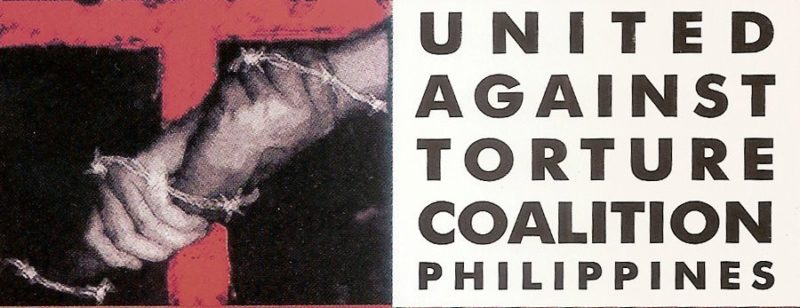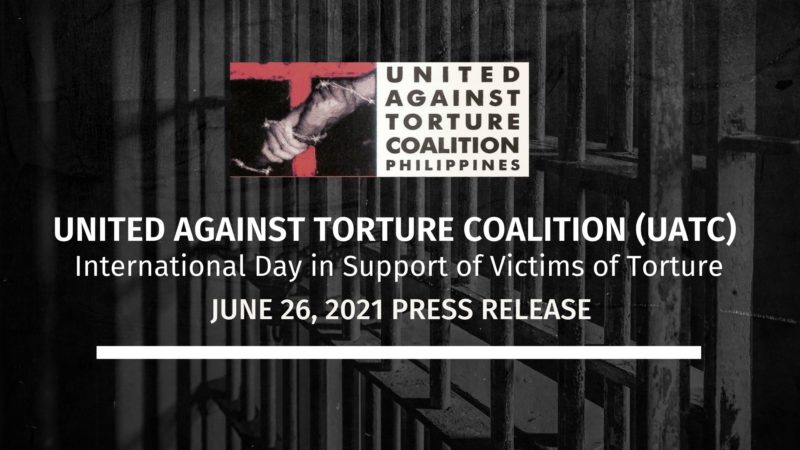
United Against Torture Coalition (UATC) – Philippines
June 26, 2021
PUBLIC STATEMENT
Philippine government must guarantee health care of persons deprived of liberty and decongest prison population to reduce the risk of COVID 19 spread.
Today, the United Against Torture Coalition (UATC)-Philippines, a network of 20+ CSOs of human rights organizations and individual human rights defenders, stands in solidarity with all anti-torture advocates, and victim-survivors and their families around the world in commemorating the International Day in Support of Victims of Torture, by calling on the Philippine government to guarantee health care of persons deprived of liberty and decongest prison population to reduce the risk of COVID 19 from spreading.
34 years ago, the world made a global commitment for the absolute prohibition of torture when the UN Convention against Torture and other Cruel, Inhuman or Degrading Treatment or Punishment (UNCAT) came into effect on June 26, 1987. The Philippines was one of the first state parties to accede to this Convention on 18 June 1986.
Despite, being considered as a crime under international law with some states even codifying it into their penal laws, torture is still widespread and systematically being practiced by many states including the Philippines in the name of national security, criminality measure and, now, as a heavy-handed response to control population in COVID 19 infected areas. The Philippines even takes pride for being considered as one of its kind in Asia to criminalize torture as a specific criminal offense with the passage of Philippine Anti-Torture Act in 2009. Yet, torture and ill treatment continue unabated in the country under a climate of impunity.
Torture is not only an act of inflicting physical and psychological pain. It also includes the adverse conditions that place persons deprived of liberty (PDLs) at the mercy of the authorities. With the jail time approach to COVID response for the violations of health protocols, the Philippine government is placing many people especially the poor and the disadvantaged to greater vulnerabilities not only from virus infection but also from discrimination and abuse. The coronavirus is feared to spread exponentially when it hits the Philippine jails, due to overcrowding, heightening the panic of the possibility of becoming the epicentre of the virus in the country.
In fact, since the outbreak of the COVID 19 pandemic last year, more than 1,000 PDLs and jail staff have been reported to have fallen ill to COVID 19, with a significant number of them dying from the viral infection. Hardest hit are mega-jail facilities such as Quezon City Jail, Cebu City Jail, Zamboanga City Jail. The facilities under the Bureau Corrections have also sustained no less than 130 cases of infected persons, with at least 15 reported deaths.
It is of public knowledge that our jail system has a congestion rate of more than 500%. The Manila City Jail, for instance, is housing 12,000 PDLs for a facility that is built to accommodate only 1,200 persons. The Quezon City Jail, too, holds more than 5,000 PDLs in its buildings that can cater only to 900 PDLs. The National Bilibid Prison, for its part, is populated by more than 28,000 PDLs sharing a space designed to house more than 6,000 people only.
Given the fact that access to health services among PDLs especially those who have pre-existing health conditions or comorbidity status is almost non-existence if not very limited. Sanitation and cleanliness in jails are far from being acceptable. Access to food and clean water remain desirable. Healthcare services are paramount in public health emergency response.
The Philippine government is under the obligations to implement the UNCAT. One of which is to afford health care to PDLs.Prisoners after all have a right to health with the same standards as other members of society and should have access to quality healthcare without discrimination. The Nelson Mandela Rules (UN Standard Minimum Rules for the Treatment of Prisoners) emphasized that the provision of health care for prisoners is a State responsibility, and that the relationship between health-care professionals and prisoners is governed by the same ethical and professional standards as those applicable to patients in the community.
If the Philippine government is really serious in its efforts to flattening the curve of the spread of COVID 19, it must include addressing prison conditionsas part of the national COVID-19 response plan. It must also address overcrowding by immediately releasing prisonerscharged with lesser crimes, withdelayed court proceedings and have deteriorating health conditions such as the elderly and the sickly for humanitarian and emergency reasons.
Today, we demand the Philippine government to show a strong commitment and decisive action towards making the country torture free by effectively preventing torture and ill treatment from happening, by exacting accountability for its commission and by reforming the places of detentions into humane, rehabilitative, and restorative environment.
UATC Members and Partner Organizations
- Amnesty International- Pilipinas
- Association of Major Religious Superior (AMRSP)
- Asian Federation Against Disappearances (AFAD
- Balay Rehabilitation Center (Balay)
- Children’s Legal Resource for Development (CLRD)
- Ex-Detainees Initiatives (EX-D)
- Families of Involuntary Disappearances (FIND)
- In Defense of Human Rights (IDEFEND)
- Medical Action Group Inc. (MAG)
- Philippine Human Rights Information Center (PhilRights)
- Task Force Detainees of the Philippines (TFDP)
—
For inquiries or communication, contact the UATC Secretariat
c/o Medical Action Group (MAG)
Tel. No.: (02) 8 273-46-09
Email: mag.1982@magph.org / edeliza.hernandez@gmail.com

